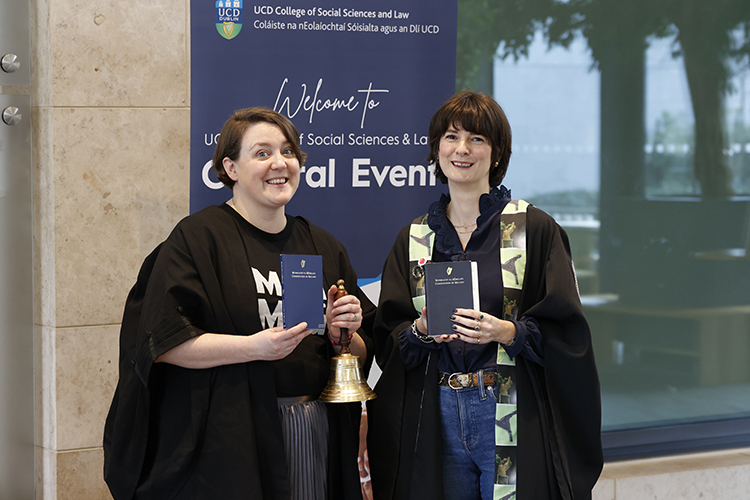Historic durational reading of Irish Constitution ahead of care and family referendums
Posted 22 February, 2024

Poet and law graduate Dr Julie Morrissy robed in the Feminist Constitutional Futures Cloak and Dr Maebh Harding, UCD Sutherland School of Law. Photo: Nick Bradshaw
Ahead of Ireland’s referendums on care and family to amend the text of Article 41 of the Irish Constitution, a durational reading of the nation’s founding document was held at UCD to consider its values and relevance to modern Ireland.
The event at the UCD Sutherland School of Law saw a reading of the Bunreacht na hÉireann as a whole, emphasising the importance of collaborative reading, reflecting on the Constitution, and sparking conversation about potential changes to its text and society.
The durational reading was led by family law academic (opens in a new window)Dr Maebh Harding and poet and law graduate Dr Julie Morrissy, and is the first time the Constitution has been publicly read and reflected upon from start to finish.
"Each time we go to the polls for a referendum we only focus on small sections of the constitution and myths about the power of Bunreacht abound,” Dr Maebh Harding, Assistant Professor at the UCD Sutherland School of Law.
“This reading encourages us to consider as a whole the fundamental values expressed in Bunreacht that guide and limit the day-to-day legislation that directly affects people's lives. Reading Article 41 aloud, together as a group emphasises its outdatedness as a guiding principle to legislate for the needs and values of modern Ireland."

The historic ceremony was part of a new UCD College of Social Sciences & Law Cultural Event Series held at the UCD Sutherland School of Law.
For the event, Dr Morrissy donned the ‘Feminist Constitutional Futures Cloak’, a piece of art that imagines what a feminist constitutional future could look like for the island of Ireland designed by Emma Campbell and Grace McMurray of the ARRAY collective.
The embroidery on the robe comes from ‘Political, Feminist Constitution of the State: The Impossible Country We Build as Women’, a manifesto written by Bolivian feminists during a period of constitutional change.
The Irish Constitution was ratified in 1937, and as the primary pillar of law of the Irish State, it has been fundamental in forming and shaping the Irish nation and the people of Ireland.
It sets-out the branches of government, the courts and how those institutions should be run, and describes the fundamental rights of every Irish citizen and acts as part of a wider human rights framework in Ireland.
Since it was ratified, the people of Ireland have gone to the polls to amend the Constitution in relation to 38 referendum questions.
Among the most notable recent amendments have been lifting the previously abortion ban unless there was a serious risk to the life of the mother, removing the constitutional ban on divorce, and lifting the restriction on civil marriage based on sex.
By: David Kearns, Digital Journalist / Media Officer, UCD University Relations
To contact the UCD News & Content Team, email: newsdesk@ucd.ie






